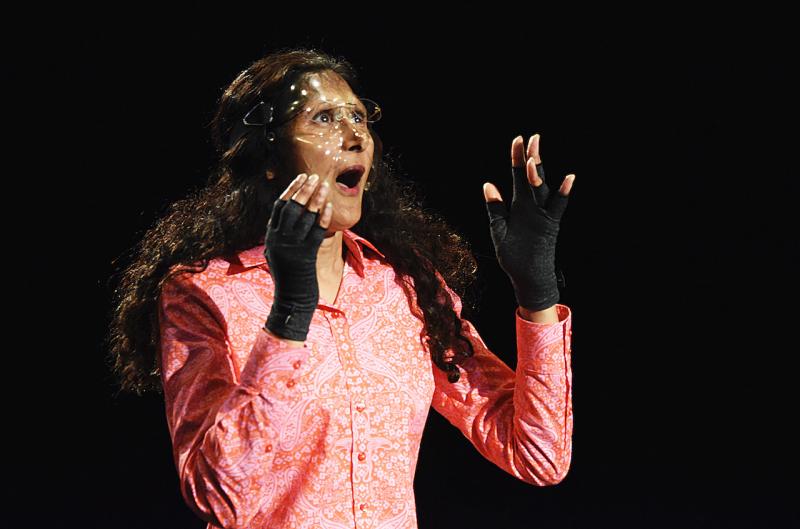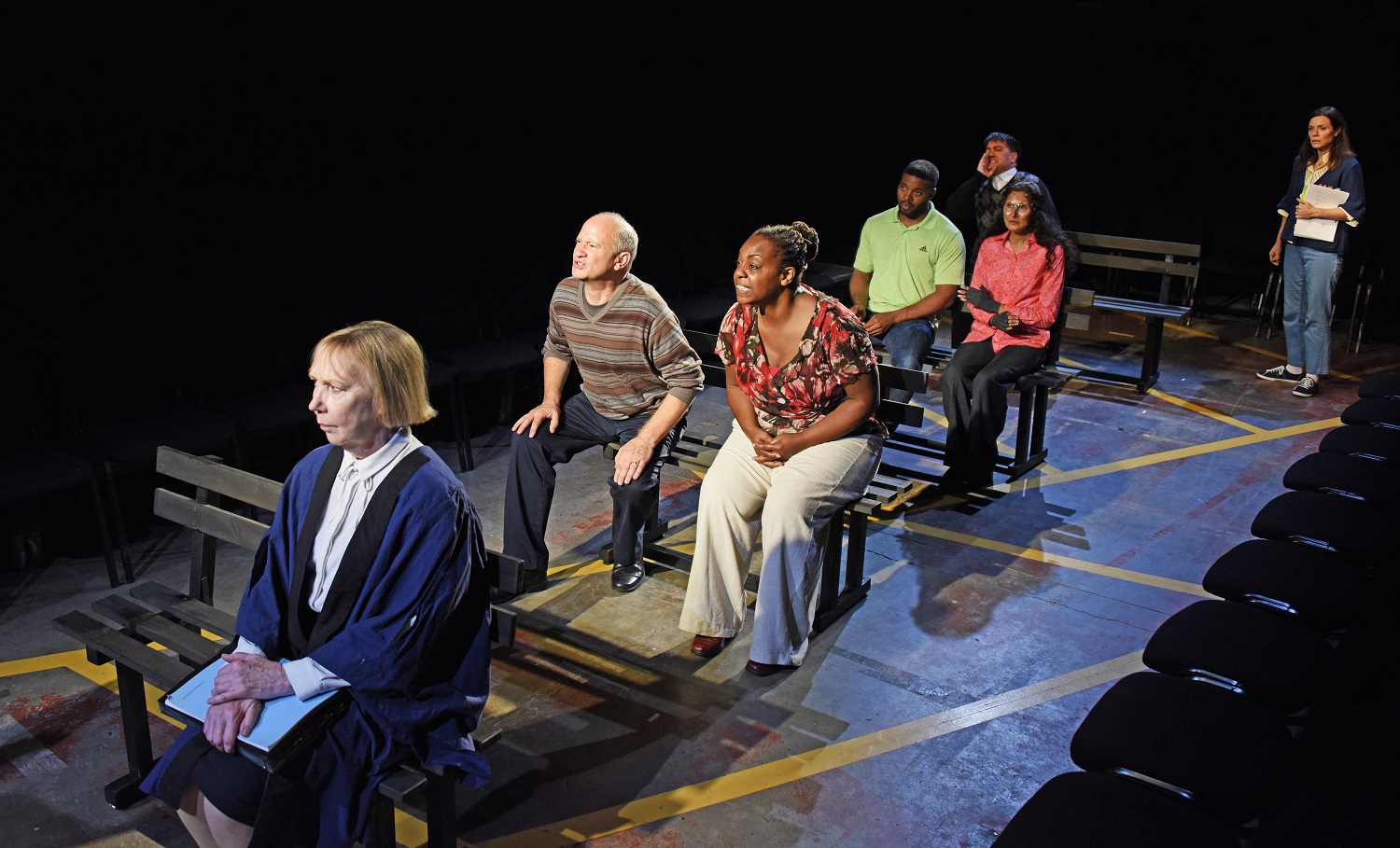The Permanent Way, The Vaults review – devastating resurrection of play tackling corporate greed | reviews, news & interviews
The Permanent Way, The Vaults review – devastating resurrection of play tackling corporate greed
The Permanent Way, The Vaults review – devastating resurrection of play tackling corporate greed
Incisive, intelligent and deeply moving

The Permanent Way first roared its way into the national consciousness in 2003 when, after a triumphant opening in York, it toured the UK before transferring to the National Theatre.
Twenty-two years after the Southall train crash – one of the four major accidents that jolted the country into realising that corporate failure could have consequences every bit as bloody as human malevolence – director Alex Lass devastatingly resurrects Hare's script. At The Vaults, always an atmospheric setting, the devastating stories of hapless mismanagement, rampant greed, and personal bereavement are played out against the quiet thunder of passing trains.
Lass’s production sets off at a brisk momentum, whirling together a kaleidoscope of voices that proclaim not so much man-on-the-street as person-on-the-platform opinions. “Britain. Beautiful place. Yeah. Shame we can’t run a railway,” declares one. “I’ve got a brain like a sparrow’s nest, all shit and sticks,” announces another, while still another compares the way the country is organised to nineteenth century Russia – not Tolstoy’s but Gogol’s; “Burueaucracy. Inefficiency. And vodka.” Questions about the accountability of those who pursue profit to the detriment of everything else underpin the two key debates of our time: Brexit and saving the environment. Even so, that doesn’t stop the evening feeling a little bit like a period piece in the first third or so, with its references to Princess Diana, John Birt’s BBC, “The BBC is much better run. The programmes are worse…” At moments you can feel as if you’re stuck at a late Nineties dinner-party. Not least with the inevitable glances back to Thatcher as the arch-villain of all that is wrong with corporate Britain.
Questions about the accountability of those who pursue profit to the detriment of everything else underpin the two key debates of our time: Brexit and saving the environment. Even so, that doesn’t stop the evening feeling a little bit like a period piece in the first third or so, with its references to Princess Diana, John Birt’s BBC, “The BBC is much better run. The programmes are worse…” At moments you can feel as if you’re stuck at a late Nineties dinner-party. Not least with the inevitable glances back to Thatcher as the arch-villain of all that is wrong with corporate Britain.
Yet the skill with which this piece of verbatim theatre is welded together starts to tell very quickly. What’s so brilliant is the way that extremely dry topics – the technical process of privatisation; the all-too-slow evolution of corporate manslaughter law – are deftly interspersed with personal stories showing the potentially lethal consequences of half-baked ideas cooked up in boardrooms and civil servants’ offices.
One of the central challenges is in presenting people who first impinge themselves on your consciousness as soundbites: verbatim theatre allows no traditional build-up of character, but a rattling reportage from which personalities slowly emerge. Thanks to incisive, intelligent and often deeply moving performances from the well-coordinated cast, after the initial blizzard of opinions and anecdotes, a timeless tragedy starts to delineate itself in front of us.
One of the early lines that really resonates is, "They didn’t tell me. You always lose your shoes." Lucas Hare, like all the cast, juggles a multitude of roles: here, talking about an unexpected aspect of accidents, he fixes the audience with a mournful stare and repeats, “When you’re thrown from the window. Don’t you know? You always lose your shoes.”
It’s in such haunting, telling details that the play is at its strongest. Four major tragedies occurred during the period it covers: the Southall crash of 1997; the Ladbroke Grove crash of 1999; the Hatfield crash of 2000; and the Potters Bar crash of 2002. We start to meet bereaved parents: Jacqui Dubois’s mother tells us tearfully that when she saw her 29-year-old son’s body, “They combed his hair into a fringe and he’s never had a fringe in his life.” A tiny, apparently absurd observation, that simultaneously potently distils how the authorities’ thoughtlessness clashed with the wreckage of the lives left undone.
On Ruth Hall’s simple, effective design – a bare stage in which four benches are continually rearranged to evoke everything from train-tracks to courtrooms – other performances become steadily more searing in their impact. Sakuntala Ramanee’s “Woman in a Mask” devastates with her quiet dignity. Anna Acton, as another bereaved mother, almost brings the evening to a halt as she weeps while talking about the callousness with which papers reported on the fireball that brought her 24-year-old son’s life to an end. Jonathan Coote is extraordinary as the British Transport Policeman who lays the ground for defining such events as corporate manslaughter. And Paul Dodds is charismatically repellent in a range of roles, not least that of John Prescott.
All the while Hare and Stafford-Clark make us think again and again: about the balkanisation of the railways; about the separation of train from track; about the elevation of management consultants over genuine experts; about political expediency. It’s a terrible litany of our modern times. There are no easy answers here, not least for those of us who remember pre-privatisation times when trains were eternally stopping mid-journey because of drivers going on strike. Compromises had to be made, but these were not the right ones. Not least for those who have to live with their consequences for ever.
- The Permanent Way at The Vaults until 17 November
- Read more theatre reviews on theartsdesk
@Hallibee1
more Theatre
 Banging Denmark, Finborough Theatre review - lively but confusing comedy of modern manners
Superb cast deliver Van Badham's anti-incel barbs and feminist wit with gusto
Banging Denmark, Finborough Theatre review - lively but confusing comedy of modern manners
Superb cast deliver Van Badham's anti-incel barbs and feminist wit with gusto
 London Tide, National Theatre review - haunting moody river blues
New play-with-songs version of Dickens’s 'Our Mutual Friend' is a panoramic Victori-noir
London Tide, National Theatre review - haunting moody river blues
New play-with-songs version of Dickens’s 'Our Mutual Friend' is a panoramic Victori-noir
 Machinal, The Old Vic review - note-perfect pity and terror
Sophie Treadwell's 1928 hard hitter gets full musical and choreographic treatment
Machinal, The Old Vic review - note-perfect pity and terror
Sophie Treadwell's 1928 hard hitter gets full musical and choreographic treatment
 An Actor Convalescing in Devon, Hampstead Theatre review - old school actor tells old school stories
Fact emerges skilfully repackaged as fiction in an affecting solo show by Richard Nelson
An Actor Convalescing in Devon, Hampstead Theatre review - old school actor tells old school stories
Fact emerges skilfully repackaged as fiction in an affecting solo show by Richard Nelson
 The Comeuppance, Almeida Theatre review - remembering high-school high jinks
Latest from American penman Branden Jacobs-Jenkins is less than the sum of its parts
The Comeuppance, Almeida Theatre review - remembering high-school high jinks
Latest from American penman Branden Jacobs-Jenkins is less than the sum of its parts
 Richard, My Richard, Theatre Royal Bury St Edmund's review - too much history, not enough drama
Philippa Gregory’s first play tries to exonerate Richard III, with mixed results
Richard, My Richard, Theatre Royal Bury St Edmund's review - too much history, not enough drama
Philippa Gregory’s first play tries to exonerate Richard III, with mixed results
 Player Kings, Noel Coward Theatre review - inventive showcase for a peerless theatrical knight
Ian McKellen's Falstaff thrives in Robert Icke's entertaining remix of the Henry IV plays
Player Kings, Noel Coward Theatre review - inventive showcase for a peerless theatrical knight
Ian McKellen's Falstaff thrives in Robert Icke's entertaining remix of the Henry IV plays
 Cassie and the Lights, Southwark Playhouse review - powerful, affecting, beautifully acted tale of three sisters in care
Heart-rending chronicle of difficult, damaged lives that refuses to provide glib answers
Cassie and the Lights, Southwark Playhouse review - powerful, affecting, beautifully acted tale of three sisters in care
Heart-rending chronicle of difficult, damaged lives that refuses to provide glib answers
 Gunter, Royal Court review - jolly tale of witchcraft and misogyny
A five-women team spell out a feminist message with humour and strong singing
Gunter, Royal Court review - jolly tale of witchcraft and misogyny
A five-women team spell out a feminist message with humour and strong singing
 First Person: actor Paul Jesson on survival, strength, and the healing potential of art
Olivier Award-winner explains how Richard Nelson came to write a solo play for him
First Person: actor Paul Jesson on survival, strength, and the healing potential of art
Olivier Award-winner explains how Richard Nelson came to write a solo play for him
 Underdog: the Other, Other Brontë, National Theatre review - enjoyably comic if caricatured sibling rivalry
Gemma Whelan discovers a mean streak under Charlotte's respectable bonnet
Underdog: the Other, Other Brontë, National Theatre review - enjoyably comic if caricatured sibling rivalry
Gemma Whelan discovers a mean streak under Charlotte's respectable bonnet
 Long Day's Journey Into Night, Wyndham's Theatre review - O'Neill masterwork is once again driven by its Mary
Patricia Clarkson powers the latest iteration of this great, grievous American drama
Long Day's Journey Into Night, Wyndham's Theatre review - O'Neill masterwork is once again driven by its Mary
Patricia Clarkson powers the latest iteration of this great, grievous American drama

Add comment